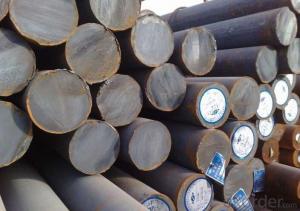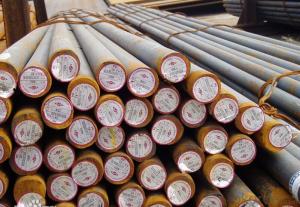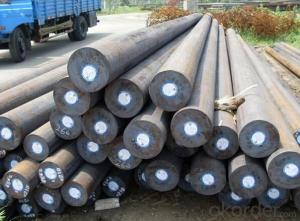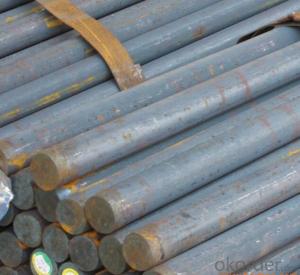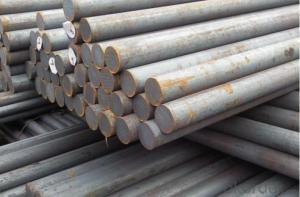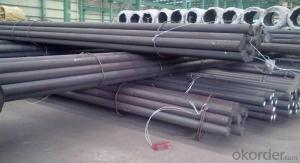aisi high strength carbon alloy steel bars
- Loading Port:
- China main port
- Payment Terms:
- TT OR LC
- Min Order Qty:
- 3 m.t.
- Supply Capability:
- 100000 m.t./month
OKorder Service Pledge
OKorder Financial Service
You Might Also Like
Item specifice
Shape: Round Bar/Square Bar/Flat Bar/Plate/Wire
Standard: GB/ASTM/SAE/AISI/DIN/JIS/EN/BS
Surface Treatment: Black/Peeling/Polished/Machined
Delivery Condition: Hot Rolled or Forged/Peeled or Black Surface
Test: SGS/UT 100% Elements Testing
Certificate: ISO/Mill Certificate
Service: 24 hours online server more than 20 years trading and manufacture
Quality Assurance: the third party inspection, such as SGS, BV, TUV…etc. is acceptable
Packaging Details: Seaworthy Packaging or as per customer's packing instruction
Are you a trading company or manufacturer? Manufacturer
What’s the MOQ? 3 metric ton
What’s your delivery time? 15-35 days after downpayment received
what’s your delivery terms? FOB/CFR/CIF
What's the Payment Terms? 30% as deposit,70% before shipment by T/T
Western Union acceptable for small amount.
L/C acceptable for large amount.
Scrow ,Paybal,Alipay are also ok
Why choose us? Chose happens because of quality, then price, We can give you both.
Additionally, we can also offer professional products inquiry, products knowledge train (for agents), smooth goods delivery, excellent customer solution proposals.
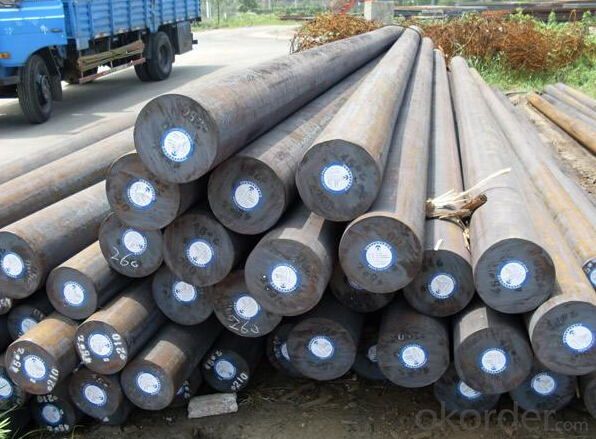
- Q:What are the applications of special steel in the nuclear supply chain?
- Special steel has numerous applications in the nuclear supply chain. It is used in the construction of nuclear reactors, where it provides the necessary strength and resistance to extreme temperatures and pressures. Special steel is also utilized in the manufacturing of fuel rods, containment vessels, and other critical components that require high durability and corrosion resistance. Additionally, special steel is employed in the production of storage containers for nuclear waste and in the construction of transportation casks for the safe transport of radioactive materials.
- Q:What are the applications of special steel in the food processing industry?
- Due to its unique properties and characteristics, special steel finds wide-ranging applications in the food processing industry. One significant use of special steel in this sector is for manufacturing equipment and machinery used in food processing plants. Its corrosion resistance and ability to withstand extreme temperatures make it ideal for frequent sanitization and operation under harsh conditions. Special steel is commonly employed in the production of blades, knives, and cutting tools used in food processing. Its high strength and durability enable these tools to maintain their sharpness and effectiveness even after prolonged use, ensuring efficient and precise cutting of food products. Another application of special steel in the food processing industry is for constructing storage tanks and containers. These tanks are utilized for storing and transporting various food products. The corrosion resistance and hygiene properties of special steel prevent contamination and ensure the quality and safety of the stored food. Moreover, special steel is also utilized in the construction of processing machinery, such as mixers, grinders, and extruders. Its high strength and stability enable these machines to handle the rigorous demands of food processing, ensuring smooth operation and minimizing downtime. Furthermore, special steel often finds application in the production of conveyor systems used in food processing facilities. These conveyors play a crucial role in moving food products along the processing line, and special steel's resistance to wear and tear ensures efficient and reliable operation, reducing the risk of product contamination. In conclusion, special steel plays an extensive and crucial role in the food processing industry. Its unique properties contribute significantly to the efficiency, safety, and quality of food processing operations, from equipment manufacturing to storage and processing machinery construction.
- Q:Can special steel be used in high-pressure applications?
- Indeed, high-pressure applications can utilize special steel. These steels, also referred to as alloy steels, are intentionally designed to possess improved mechanical properties, including high strength, ductility, and resistance to corrosion. These characteristics make them suitable for enduring high-pressure settings. Industries such as oil and gas, aerospace, automotive, and power generation often employ special steels due to their high-pressure applications. In the oil and gas sector, for instance, special steels are utilized in the production of high-pressure pipelines, valves, and pressure vessels that can withstand the intense pressure conditions during processes like oil drilling, transportation, and refining. The exceptional strength of special steel enables it to withstand the internal pressure exerted by fluids or gases without any deformation or failure. Additionally, its corrosion resistance ensures that the steel remains intact and undamaged even in the demanding operating conditions frequently encountered in high-pressure applications. Furthermore, special steels can be customized to meet specific requirements by adjusting their chemical composition and heat treatment processes. This customization allows the steel to exhibit even greater strength, toughness, and fatigue resistance, thereby making it an ideal choice for applications in high-pressure environments. To summarize, special steel can be utilized in high-pressure applications owing to its enhanced mechanical properties and resistance to corrosion. Its ability to endure extreme pressures makes it a dependable option for numerous industries that encounter high-pressure conditions.
- Q:How does special steel contribute to the defense aftermarket industry?
- Special steel plays a crucial role in the defense aftermarket industry by providing enhanced strength, durability, and resistance against extreme conditions. This allows for the manufacturing of high-performance components and equipment, such as armored vehicles, aircraft, and naval vessels. Special steel's unique properties enable the production of advanced weaponry and protective gear, ensuring the safety and effectiveness of defense operations. Additionally, its ability to withstand intense heat and pressure makes it ideal for critical applications like missile guidance systems and nuclear reactors. Overall, special steel is an essential material that drives innovation and strengthens the capabilities of the defense aftermarket industry.
- Q:What are the properties of structural steel?
- Structural steel possesses various properties that make it ideal for construction purposes. It has high strength-to-weight ratio, meaning it can support heavy loads while being relatively lightweight. Steel is also ductile, allowing it to be easily shaped and formed into various structural elements. Additionally, it exhibits excellent durability and resistance to corrosion, making it suitable for long-lasting structures. Moreover, structural steel is fire-resistant, providing enhanced safety in case of a fire. Overall, these properties make structural steel a highly versatile and reliable material in the construction industry.
- Q:What are the different mechanical properties of special steel?
- Special steels typically have enhanced mechanical properties compared to regular steels, which makes them suitable for specific applications. Some of the key mechanical properties of special steels include high tensile strength, excellent toughness, improved wear resistance, increased hardness, and enhanced corrosion resistance. Additionally, special steels can exhibit specific properties such as high heat resistance, low thermal expansion, and good machinability, depending on the alloying elements and heat treatment processes used during their production. These unique mechanical properties make special steels highly sought after in industries such as automotive, aerospace, construction, and manufacturing.
- Q:What are the main applications of special steel in the medical implants?
- Special steel is widely used in medical implants due to its unique properties and high biocompatibility. It is primarily used in applications such as orthopedic implants, cardiovascular devices, dental implants, and surgical instruments. The excellent strength, corrosion resistance, and ability to withstand sterilization processes make special steel ideal for these applications, ensuring long-term durability and patient safety. Additionally, the versatility of special steel allows for the production of complex implant designs, promoting better integration with the patient's body and enhancing overall implant performance.
- Q:What are the different surface modification techniques used for special steel?
- There are several surface modification techniques used for special steel to enhance its properties and improve its performance in specific applications. Some of the common techniques include: 1. Nitriding: Nitriding is a surface hardening process that involves the diffusion of nitrogen into the steel surface. It forms a hard layer of nitrides, which significantly increases the surface hardness, wear resistance, and fatigue strength of the steel. 2. Carbonitriding: Carbonitriding is a similar process to nitriding, but it involves the diffusion of both carbon and nitrogen into the steel surface. This technique increases the surface hardness and also improves the wear resistance and fatigue strength of the steel. 3. Case hardening: Case hardening involves the addition of a hard, wear-resistant layer to the surface of the steel. This can be achieved through processes like carburizing or carbonitriding, where carbon is introduced into the surface layer, transforming it into a high-carbon martensitic layer. 4. Shot peening: Shot peening is a technique that involves bombarding the steel surface with small, high-velocity shots of media, such as steel, ceramic, or glass beads. This process induces compressive stresses on the surface, improving its fatigue strength and resistance to stress corrosion cracking. 5. Electroplating: Electroplating is a common technique used to apply a thin layer of metal coating onto the steel surface. This can be done with various metals like zinc, nickel, or chromium, providing protection against corrosion, improving aesthetics, and enhancing wear resistance. 6. Physical vapor deposition (PVD): PVD is a coating technique that involves depositing thin layers of material onto the steel surface through a vacuum process. This technique can be used to apply coatings like titanium nitride (TiN), which provides excellent wear resistance and reduces friction. 7. Laser surface modification: Laser surface modification techniques, such as laser hardening or laser alloying, use a high-energy laser beam to selectively heat and modify the steel surface. This process can improve hardness, wear resistance, and corrosion resistance. These surface modification techniques can be tailored to meet specific requirements, enhancing the properties of special steel for various applications in industries such as automotive, aerospace, and tooling.
- Q:What are the different corrosion testing methods used for special steel?
- There are several corrosion testing methods used for special steel, including salt spray testing, electrochemical testing, immersion testing, and accelerated corrosion testing. These methods help to assess the corrosion resistance and durability of special steel in different environments and conditions.
- Q:What are the different surface finishing techniques for special steel?
- Some of the different surface finishing techniques for special steel include electroplating, powder coating, passivation, etching, and polishing.
1. Manufacturer Overview |
|
|---|---|
| Location | |
| Year Established | |
| Annual Output Value | |
| Main Markets | |
| Company Certifications | |
2. Manufacturer Certificates |
|
|---|---|
| a) Certification Name | |
| Range | |
| Reference | |
| Validity Period | |
3. Manufacturer Capability |
|
|---|---|
| a)Trade Capacity | |
| Nearest Port | |
| Export Percentage | |
| No.of Employees in Trade Department | |
| Language Spoken: | |
| b)Factory Information | |
| Factory Size: | |
| No. of Production Lines | |
| Contract Manufacturing | |
| Product Price Range | |
Send your message to us
aisi high strength carbon alloy steel bars
- Loading Port:
- China main port
- Payment Terms:
- TT OR LC
- Min Order Qty:
- 3 m.t.
- Supply Capability:
- 100000 m.t./month
OKorder Service Pledge
OKorder Financial Service
Similar products
New products
Hot products
Related keywords
